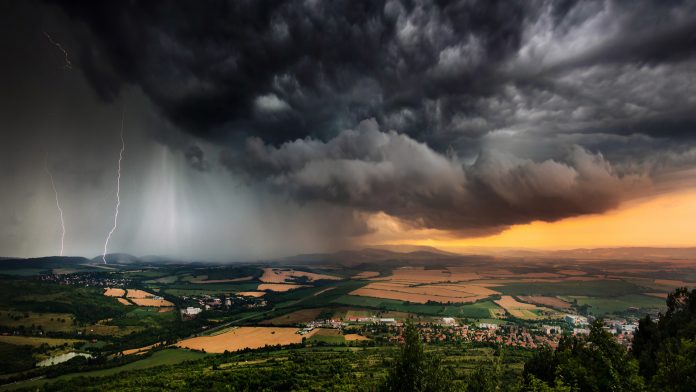An investigation by a team of climate experts has identified that European storms will be significantly intensified in the coming years due to climate change.
The study, conducted by researchers at Newcastle University and the Met Office, indicates that climate change is exacerbating European storms, both in terms of frequency and intensity, potentially having disastrous consequences for people and infrastructure.
Their research is published in the journal Geophysical Research Letters.
When it rains, it pours
The climate scientists investigated how climate affects the intensity of European storms, determining that there will be a substantial increase in the occurrence of slow-moving, intense rainstorms, estimated to rise by up to 14 times in frequency across land by the end of the century. The most concerning aspect of these slow-moving European storms is that they characteristically have very high precipitation accumulations, producing severe impacts.
The team utilised extremely detailed climate models at the UK Met Office Hadley Centre to conduct their investigation, discovering that slower storm movement increases the amount of rainfall that accumulates locally, raising the dangers of flash floods across Europe. Their results signified that European storms that produce heavy rain might move slower due to climate change, which increases the exposure to these extremes.
Dr Abdullah Kahraman, the leader of the study from Newcastle University’s School of Engineering, said: “With recent advances in supercomputer power, we now have pan-European climate simulations resolving the atmosphere in great detail as short-range weather forecasting models do. These models have grid spacing of approximately 2 km, which allows them to simulate storm systems much better, resulting in a better representation of extremes.
“Using these state-of-the-art climate simulations, we have developed metrics to extract potential cases for heavy rainfall and a smaller, almost-stationary subset of these cases with the potential for high rainfall accumulations. These metrics provide a holistic view of the problem and help us understand which factors of the atmosphere contribute to heavy rainfall changes.
“This is one of the first studies to explore changes in the speed of such heavy rainfall systems – an important aspect contributing to flooding risk. Currently, we are also investigating other extreme weather types by examining the climate simulations data with a severe weather forecaster’s perspective.”
Professor Hayley Fowler, also of Newcastle University’s School of Engineering, added: “Governments across the world have been too slow in reducing greenhouse gas emissions and global warming continues apace. This study suggests that changes to extreme storms will be significant and cause an increase in the frequency of devastating flooding across Europe. This, alongside the current floods in Europe, is the wake-up call we need to produce improved emergency warning and management systems, as well as implementing climate change safety factors into our infrastructure designs to make them more robust to these severe weather events.”
Professor Lizzie Kendon, Science Fellow at the Met Office and Professor at Bristol University, said: “This study shows that in addition to the intensification of rainfall with global warming, we can also expect a big increase in slow-moving storms which have the potential for high rainfall accumulations. This is very relevant to the recent flooding seen in Germany and Belgium, which highlights the devastating impacts of slow-moving storms.
“Our finding that slow-moving, intense rainstorms could be 14 times more frequent by the end of the century under the high emissions RCP8.5 scenario shows the serious impacts that we may expect across Europe if we do not curb our emissions of greenhouse gases.”
Alleviating impacts of European storms
The investigation highlighted the necessity for further climate mitigation strategies and adaptation of policy in Europe. Additional research could aid in producing action plans to reduce the devastation of flooding, design infrastructure to withstand it, and better manage water resources.
Traditionally, almost stationary intense rainstorms are uncommon in Europe and occur over areas of the Mediterranean Sea rarely. Achieving more accurate predictions of future fluctuations in intense rainfall events will be crucial to providing effective adaptation and mitigation plans to limit the effects of climate change.









